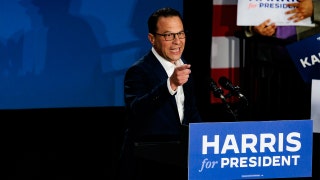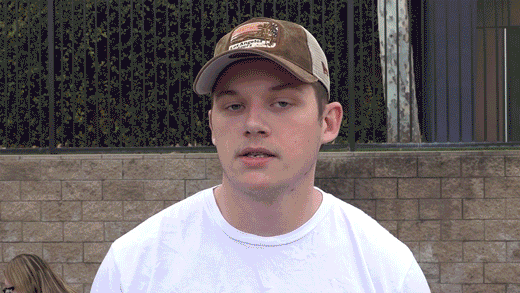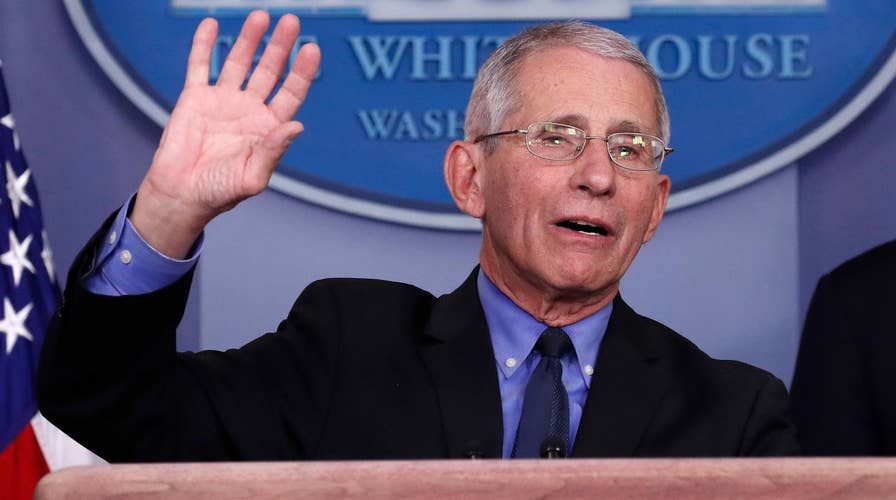Dr. Fauci: Several coronavirus vaccines are at different testing stages
National Institute of Allergy and Infectious Diseases director Dr. Anthony Fauci discusses social distancing and the trials that go into testing vaccines.
Get all the latest news on coronavirus and more delivered daily to your inbox. Sign up here.
Coronavirus task force member Dr. Anthony Fauci said on Sunday the Centers for Disease Control and Prevention’s travel advisory that was implemented on Saturday “ultimately will help stop” the spread of the novel coronavirus.
Fauci, the director of the National Institute of Allergy and Infectious Disease, made the comment on CNN’s “State of the Union” on Sunday.
President Trump on Saturday night said the administration would not be issuing a quarantine on New York, parts of New Jersey and some of Connecticut as part of the efforts to curb the spread of the coronavirus.
CLICK HERE FOR ALL CORONAVIRUS COVERAGE
Trump noted that instead, the CDC issued a Domestic Travel Advisory urging against "non-essential domestic travel" in the tri-state area for 14 days.
"Due to extensive community transmission of COVID -19 in the area, CDC urges residents of New York, New Jersey, and Connecticut to refrain from non-essential domestic travel for 14 days effective immediately," the CDC said, noting that the advisory doesn't apply to "employees of critical infrastructure industries, including but not limited to trucking, public health professionals, financial services, and food supply."
Fauci said on Sunday that the task force has had "very intensive discussions" at the White House with the president this weekend.
“As you know, the original proposal was to consider seriously an enforceable quarantine," he said. "After discussions with the president, we made it clear, and he agreed, that it would be better to do what’s called a strong advisory.”
SWEDEN REMAINS OPEN AS OTHER COUNTRIES LOCK DOWN OVER CORONAVIRUS
Fauci explained the reasoning behind the decision saying, “you don’t want to get to the point that you’re enforcing things that would create a bigger difficulty, morale and otherwise when you could probably accomplish the same goal.”
Fauci went on to say that one issue is that “about 56 percent of all of the new infections in the country are coming from” New York City.
“So what was trying to be done is to get people, unless there’s necessary travel, so all nonessential travel, to just hold off because what you don’t want is people traveling from that area to other areas of the country and inadvertently and innocently infecting other individuals,” Fauci explained.
“We felt the better way to do this would be an advisory as opposed to a very strict quarantine and the president agreed, and that’s why he made that determination last night,” he continued.
New York is now the epicenter of the coronavirus outbreak in the United States, with more than 52,000 positive tests for the illness and more than 700 deaths. About 7,300 people were in New York hospitals Saturday, including about 1,800 in intensive care.
“So we want to strongly do mitigation in those areas like New York City and the surrounding metropolitan area,” Fauci said on Sunday, adding that at the same time the admiration does not want to “neglect other areas of the country where it looks like there are just relatively few infections.”
He explained that “if we do testing, identification, isolation, getting people out of circulation who are infected, and contact tracing, we might be able to prevent those areas from getting to that stage where we would have to do mitigation, which is much more difficult and much more frustrating than trying to contain.”
When asked if the guidelines will be lifted early this week when the president’s 15-day plan to beat the virus is expected to reach that time frame Fauci said, “I want to see is a flattening and a turning down of the curve.”
He noted that the administration will not be pulling back measures on the hot spots including New York.
“When we start to see a daily number of cases instead of increasing and escalating, they start to flatten out, turn the corner and then start coming down, when we see that, then you can start doing the modification of the intensity of your mitigation,” Fauci said.
“The virus itself determines that timetable,” he added.
Fauci went on to say that at the end of the 15 days members of the Coronavirus Task Force will discuss what to do next.
“My own opinion, looking at the way things are, I doubt if that would be the case, but we’re a group, we’re a task force, we’re going to sit down and we’re going to be talking about it," he said.
CLICK HERE TO GET THE FOX NEWS APP
He added, “Obviously what you see me describe, it’s a little iffy there so we’ll take it as it comes, we’ll look at it and if we need to push the date forward, we will push the date forward.”
Fox News’ Gregg Re, Adam Shaw, and the Associated Press contributed to this report.










































